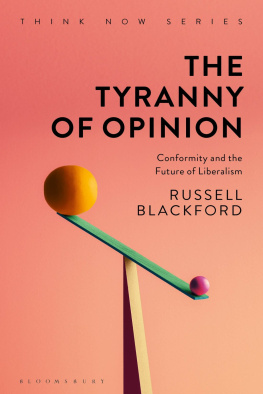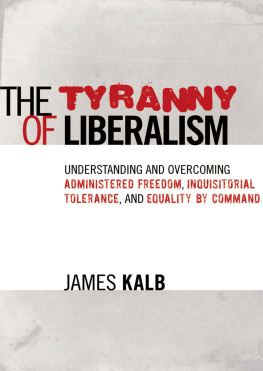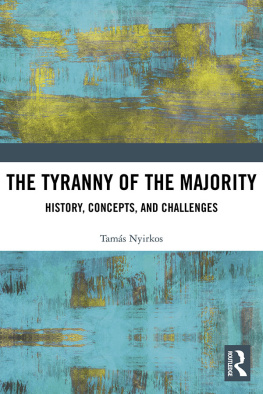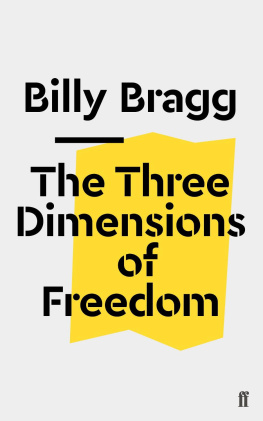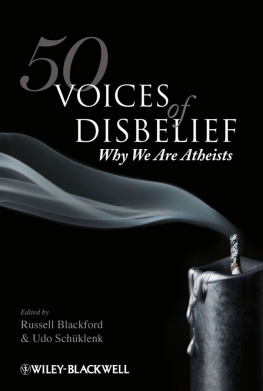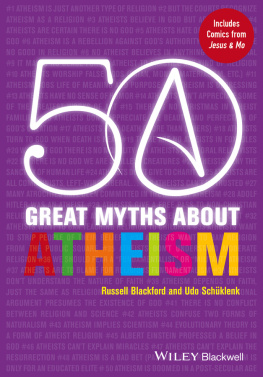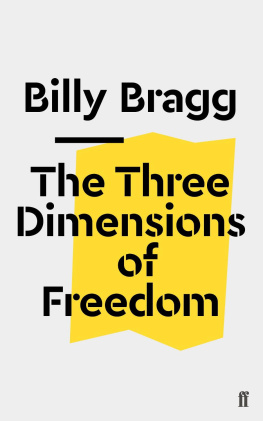The Tyranny of Opinion
Also Available from Bloomsbury
The Ethics of Climate Change, James Garvey
Personal Responsibility, Alexander Brown
Slow Philosophy, Michelle Boulous Walker
Judged, Ziyad Marar
Dying for Ideas, Costica Bradatan
To Janeen Webb, who has my back.
THE TYRANNY OF OPINION
Conformity and the Future of Liberalism
Russell Blackford

Contents
I have talked about this book with many friends and colleagues, and theyve invariably told me that I am brave writing on such a subject. But Im not all that brave. Mostly, Im more buffered than the many decent, socially concerned people around me who feel intimidated by the current intellectual environment. My sincere thanks to everyone who has spoken to me over the past three or four years, sharing perspectives on the sensitive topic of social and political conformity and the ways in which it is enforced. Needless to say, the particular opinions expressed herein are my own and should not be attributed to anybody else, including the people whom Im about to name specifically.
Kenan Malik encouraged me to write a book on this topic, acted as an inspiration throughout, and kindly sent me an advance copy of his afterword to the second edition (still forthcoming at the time) of From Fatwa to Jihad . Thanks, too, to Laura Moriarty for providing me with an advance copy of her novel American Heart so I could read it for myself before its publication.
During the planning and writing phases, and beyond, Jenny Blackford encouraged and helped me in endless ways. Among other things, she put up with my distracted moods and solitary habits over the months when I worked intensely at the project for long (and usually odd) hours. I cant thank her enough. Jennys presence in my life has kept me sane as Ive wrestled with complicated issues on which I have passionate, if sometimes ambivalent, views.
Jeremy Stangroom encouraged me from the beginning and was instrumental in the books publication by Bloomsbury. Our exchanges in person and by email have helped me hone my ideas. Jeremy is also, be it noted, a model of genuine liberalism.
Jenny and Jeremy read the first draft of the entire manuscript, and each of them provided me with astute, helpful, detailed feedback. Jenny has also helped with later drafts. Ive dedicated this volume to Janeen Webb, who has been a trusted friend and confidant throughout the process (and always). I doubt that she will agree with everything herein, but weve spoken often on related topics, and shes another person who has helped keep me going. You can blame her for that, but not for the content that follows.
Note: The text that follows discusses social and political situations that are often volatile. It is intended to be up to date as of the beginning of June 2018. One significant event that took place shortly after final corrections to the text was the settlement, announced on 18 June 2018, of litigation by Maajid Nawaz against the Southern Poverty Law Center (see pages 14953 in Chapter 7). The settlement included a public apology to Nawaz and a sum of $3.375 million. While litigation should never have been necessary in this case, the outcome does illustrate the ongoing importance of the law for redress when individuals are harmed by unjustified attacks on their reputations.
Reasons to be fearful
Im afraid. Like many people, Im afraid to speak up and say exactly what I think. Im afraid to contribute to public debate with total frankness. Im more afraid of allies than I am of opponents, since the latter can do me less harm (though if theyre so minded they can probably do enough!). Im not afraid of my closest friends, the people who love me, who have my back and will keep my secrets, but it gets more frightening as soon as I step out into wider circles of colleagues and acquaintances.
Im afraid, but Im less afraid than many. I do speak out, at selected times, when I see what looks like injustice: injustice, that is, wrought by my own tribe (or some approximation of it). That takes a smidgen of courage. It takes much less to criticize opponents which at least gets you encouragement from your own people. Im afraid, as a matter of fact, that this very book will lose me friends (no, not my closest friends; but still ) and get me ostracized in some circles, but Ive taken a deep breath and started writing. Perhaps Im foolhardy or contrarian or pig-headed, or perhaps I have a touch of the Galilean personality described by Alice Dreger in her undoubtedly brave book Galileos Middle Finger (2015: 141). Its largely, I think, that Im less vulnerable than most. Im not as young as Id like to be; Ive accumulated some modest assets; and for now, at least, Im semi-retired and dont need to climb a career ladder.
If I were a bit younger, a bit less physically comfortable and financially buffered, a bit more dependent on networks of contacts and others goodwill, Id be more afraid than I am. I wouldnt write a book like this.
Much of what follows is critical of the Left, or what popularly counts as the Left in countries where socialist and communist ideas have little political clout. Much of it is critical of what currently counts as liberalism. Im especially critical of many academic and cultural manifestations of supposedly left-wing or liberal thought. But my critique does not come from the Right.
Allow me to unpack my own political views and values, insofar as Im consciously aware of them. First, Im not an apologist for any kind of social or religious conservatism; Im not, for example, another Dinesh DSouza, whom Udo S chklenk and I somewhat excoriate throughout an earlier book (Blackford and S chklenk 2013). Im not keen on religion ( any religion) or religious morality ( any religious morality). Im not looking backward to a better time, because theres none that I know of to be found in human history. Even since the 1970s the optimistic, psychedelic decade when I came of age much has improved. When it comes to economic issues, Im a standard European-style social democrat. In the United States, Id probably be labelled a socialist, but some Americans label people as socialists at the drop of a Stetson hat. To be blunt, not for the last time, what follows is not a taxation-is-theft sort of book. I have a libertarian streak, as will become apparent, but Im not that kind of libertarian.
I do take a clear position in favour of individual liberty. This includes, for example, my support for womens reproductive rights: I see no need for the state to ban abortion at any stage of pregnancy (for a bit more, see Blackford 2002). I want the state to keep its laws off womens bodies. Likewise, I support the rights of gay men and lesbians, including the right to marry. I strongly support the option of physician-assisted suicide. I dislike the carceral state, which has expanded to an absurd and immensely destructive extent in the United States in particular, and I detest the war on drugs that has dominated too much policing in Western countries.
I come from a working-class family, and I grew up in an industrial city in Australia that was dominated at the time by its steelworks. Im the first person from my family ever to attend university. I still have those connections, and Ive inherited some blue-collar, trade-union values. But my social circle is one of mainly left-wing (to varying extents) academics, authors, journalists, lawyers, and artists. Within my milieu we like fine wine, coffee (but preferably not instant coffee!), excellent cheese, and The Guardian . I dont want to brag, but were sophisticated, cosmopolitan people.

